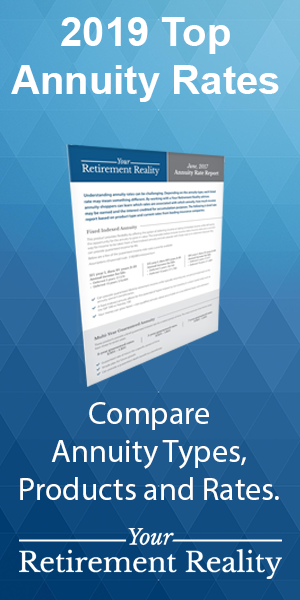Life is unpredictable. And for many, fear of the unknown can breed worry and concern. However, addressing those fears and planning ahead can be one of the best ways to manage an unpredictable future.
Retirement concerns for many people tend to center on health and money, which are in many ways intertwined. For example, your health plays into how long you can work, how much you’ll need to spend on insurance and medical care, where you can live, and your quality of life in retirement. Peace of mind in retirement comes with having planned ahead—putting you in control rather than at the mercy of the unknown.
The first step in retirement income planning is awareness—you have to understand the potential pitfalls before you can address them. That’s why we’ve put together this list of the top five common retirement income concerns many people face today, followed by some suggestions for how you can address them when mapping out your retirement income strategy:
1. Outliving your money
The general population is living longer, and many of us haven’t banked enough for retirement. Outliving your money includes the very real possibility of having to work through your golden years or living on a budget that may be just enough to hold you over from one Social Security check to the next. Use the Plan for a Long Retirement interactive tool to see the likelihood that a 65-year-old will live another 10, 20 or 30 years.
2. When to draw Social Security
Although you can begin to draw reduced Social Security benefits at 62, the longer you wait (up to age 70), the bigger the payout. Your decision about when to begin drawing Social Security benefits should be based largely on your health, how long you plan on working, and your assets.
3. Earning low interest rates
Paltry rates on certificates of deposits, money market, and savings accounts limit the options for growing retirement funds. If you’ve had to dip into emergency funds due to setbacks such as a job loss, getting caught up to where you need to be may not be easy. Revisit your retirement income strategy and consider exploring other income source options that may better meet your goals.
4. Paying long-term debts
The debts many people now carry later in life are different from those older adults had a few decades ago. For example, according to a 2014 analysis by the Consumer Financial Protection Bureau1, 30 percent of homeowners over 65 are still paying on a mortgage, and many people are carrying student loan debt well into their 40s and 50s. Having to pay down debt can prevent you from saving for retirement. This means you may need another means for generating income in your later years.
5. Allocating assets
Licensed financial professionals have traditionally advised their clients to modify an aggressive asset management strategy the closer they get to retirement. If you need to create an additional revenue stream to supplement Social Security benefits, you may need to explore different options for income generation.
Options to Address Your Retirement Concerns
One way to hedge against these pitfalls is with a mix of insurance and financial solutions. Annuities, for example, allow you to supplement Social Security or a pension income by receiving a steady income stream for a set number of years, or even the rest of your life. The cash-value growth of variable and universal life insurance policies can provide additional income with better-than-average interest rates.
There are many more options are available, and a licensed insurance and/or financial professional can help you figure out where you stand in relation to where you want to be—and to help you get there when you’re ready.
Get started today by calling 844-880-8255 for a no-obligation retirement income checkup with a helpful Your Retirement Reality guide.
1. “Snapshot of Older Consumers and Mortgage Debt.” Consumer Financial Protection Bureau. May 2014.
By responding and/or providing your information, you may be contacted to discuss possible retirement income solutions including insurance and annuity products. If requested, you may be referred to a licensed insurance or financial professional.
Annuities are insurance products backed by the claims-paying ability of the issuing company; they are not FDIC insured; are not obligations or deposits of, and are not guaranteed or underwritten by any bank, savings and loan or credit union or its affiliates; are unrelated to and not a condition of the provision or term of any banking service or activity. Annuities may be subject to fees and or surrender charges, which vary by product.
The presenters of this information are not associated with, or endorsed by, the Social Security Administration or any other government agency.
This material has been prepared for informational and educational purposes only. It is not intended to provide, and should not be relied upon for, accounting, legal, tax or investment advice. Please consult with a professional specializing in these areas regarding the applicability of this information to your situation. The presenters of this information are not associated with, or endorsed by, the Social Security Administration or any other government agency.
14152

